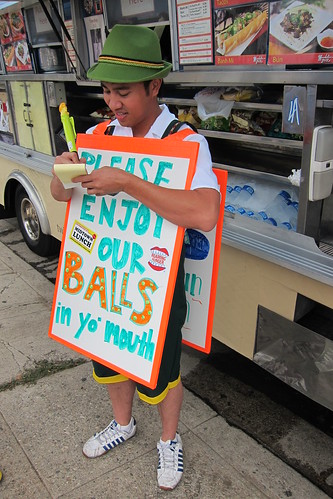 It was the knock Nguyen and Thi Tran had been dreading for six months. The ambitious married couple had been flouting the law, and the city of Los Angeles had finally come to crack down.
It was the knock Nguyen and Thi Tran had been dreading for six months. The ambitious married couple had been flouting the law, and the city of Los Angeles had finally come to crack down.
Had the Trans been selling weed or faux Louis Vuitton handbags, they could have set up a “clinic” or a Santee Alley stall and made a nice living. They were engaged in a different kind of illegality: running an underground supper club known as Starry Kitchen out of their two-bedroom North Hollywood apartment.
As in San Francisco, Portland and Olympia, supper clubs have become ubiquitous in Los Angeles. They offer the thrill of the illicit and a rare form of communal dining. You’re not at home, but you’re not in a restaurant; you’re among strangers, but they actually want to mingle.
Jen Garbee wrote the book on truly underground supper clubs back in 2008. Since then, they’ve hit the mainstream, even making it into an episode of this season’s “Next Food Network Star.” Now that supper clubs are firmly established and their outlaw allure has somewhat faded, what’s the next phase in their evolution?
One-Night Stands…
Over a decade ago, I visited Olympia, Washington, where I stayed in a local musician’s apartment. She routinely left her door unlocked. People came in to borrow clothes or leave mix tapes. My last day in town, two women showed up and began peeling potatoes, chopping vegetables and printing menus.
When I returned to the apartment that night, they had set up a dozen tables in the living room. They served simple vegetarian fare (a full meal cost under $10). People chatted as they waited for their food. Here, everyone knew each other, but to be here, you had to be in the know. This was my first taste of the supper club paradox: Exclusivity served up alongside egalitarianism.
Since then, I’ve encountered supper clubs and secret cafes from San Francisco to Portland. These days, there are at least a dozen prominent Los Angeles supper clubs. There are specialty supper clubs catering to vegetarians, vegans, raw foodists, you name it. There are posh supper clubs that cost upwards of $150, complete with liquid nitrogen circus tricks.
Even alcohol isn’t immune to the trend. The Edison in February 2010 resurrected Radio Room, its monthly cocktail night, guest-hosted by mixologists like Erick Castro formerly of San Francisco’s Rickhouse, Brian Miller of New York’s Death & Co. and Zane Harris of Seattle’s Rob Roy. Pharmacie, a nomadic cocktail club, is often held in venues legally prohibited from serving alcohol. It has no website or Twitter feed. You can only get on the list by knowing someone. (Truly underground restaurants and cocktail clubs will rarely advertise via a website. When they become supper clubs, they generally go legit and secure a catering license, though they may try to maintain a speakeasy feel.) Pharmacie’s wrap-up event for the 2010 summer season, B-Sides & Rarities, offered attendees three cocktails for $30, along with a brief lecture by the host, explaining why he paired obscure liquors like Torani Amer and Punt E Mes vermouth with the B-sides playing in the background.
In August, Portland chef Craig Thornton began inviting the public to Wolvesmouth, his underground, pay-what-you-can supper club. He was an “overnight” sensation, quickly landing on the Carson Daly show. In fact, he’d been staging these dinners for five years. Thanks to a few well-placed guests who spread the word to L.A.’s food blogging community, Thornton had quickly become known for his epic meals (11-16 courses) composed of ingredients so varied, it sometimes seemed as if he were playing a Surrealist cooking game.
Thornton made the most incongruent combinations work and brought out innovative spins on classic dishes. His “Fuck BP” course, something he could never serve in a proper restaurant, was plate of squid, uni, oyster, fluke, mussel and clam atop an artful mess of orange uni “polenta,” a splash of black squid ink and dots of bright green parsley oil. In lieu of a traditional cheese course or a loaded baked potato, he combined the two into a cheddar and potato bisque so thick you could stand your utensils up in it, then topped it with bacon crumbles and scallions.
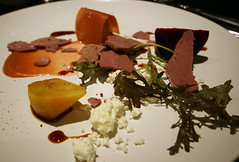 In early October, he moved from the Hollywood Hills to a downtown L.A. loft. The price of success. Yet Thornton is happy running Wolvesmouth as a supper club and has no brick-and-mortar ambitions.
In early October, he moved from the Hollywood Hills to a downtown L.A. loft. The price of success. Yet Thornton is happy running Wolvesmouth as a supper club and has no brick-and-mortar ambitions.
“The whole concept is anti-restaurant in a way,” Thornton says. “Owning a restaurant means you just end up doing paperwork and solving problems all day. This is my way of being able to cook all the time and cook the food that I want to cook. For most chefs, if you don’t have a restaurant, you’re not a real chef. I’ve been told that a million times. At the end of the day, I don’t give a damn.”
…Or Long-Term Relationships?
For a subset of motivated chefs and amateur cooks, the supper club and its close cousin, the pop-up restaurant, is a test run for an eatery of their own. Nowhere in Los Angeles is that more transparent or more elevated than Test Kitchen LA. In August, Bill Chait and Brian Saltsburg transformed a middling, neighborhood pizza joint into, well, a test kitchen. Music clubs have different acts every night. Why shouldn’t restaurants have different chefs? It’s one of those brilliant ideas that makes you kick yourself and wonder: Why didn’t I think of that?
“I think L.A. has a really vibrant underground dining scene, from food trucks to the Animals and the Lazy Oxes, the small places where the chef controls the vision,” Saltsburg says. “You’re eating somewhere with experimental or new cuisine delivered by somebody who you may or may not be familiar with. In my mind, all of these are related. It’s a very interesting city right now.”
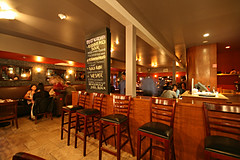 Chef Ricardo Zarate of Mo-Chica is working on an anticucho concept to launch just above Test Kitchen when it comes to the end of its run in November or December. Already, the restaurant has bounced around between high-profile chefs like Michael Voltaggio, Walter Manzke, John Rivera Sedlar, Jordan Kahn and Amy Pressman as well as a slew of former “Top Chef” contestants and local chefs like Chicks With Knives.
Chef Ricardo Zarate of Mo-Chica is working on an anticucho concept to launch just above Test Kitchen when it comes to the end of its run in November or December. Already, the restaurant has bounced around between high-profile chefs like Michael Voltaggio, Walter Manzke, John Rivera Sedlar, Jordan Kahn and Amy Pressman as well as a slew of former “Top Chef” contestants and local chefs like Chicks With Knives.
Launched two-and-a-half years ago, Chicks With Knives is a private monthly supper club hosted by Rachael Narins and Suzanne Griswold. Narins had attended a Ghetto Gourmet dinner and loved the concept. “I had been working in a restaurant, and I wished I could do nice food again,” says Griswold. “We wanted to do something creative and in line with how we live.” To that end, CWK’s ethic is SOLE: sustainable, organic, local, ethical. They hit at least two of their goals, often all four, with every dish.
Their roving dinner party offers an element of excitement for guests (you never know who you’ll meet) and allows the chefs to constantly experiment with their menu, but it’s not an easy gig, setting up shop in an unfamiliar kitchen every month. At a recent dinner in the home of an attorney living in the Hollywood Hills, the duo found themselves working in a large but sparsely equipped kitchen. The tomato bread pudding was baking, usurping precious oven space from another dish. There were pink peppercorns to be shelled and tomatoes from Narins’ community garden to be pulled off the vine and washed. Portion sizes varied. They did their best to push from the far end of the counter, but some guests had to leave before dessert.
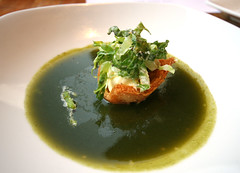 Run as a private social organization, Chicks With Knives is totally legitimate and above-board. “People who come to our events are members of our club. We are by invite only,” Griswold says. (You can sign up for the newsletter on their website.) Their events cost $62-82, include four courses plus appetizers and can usually seat 13-36 guests. Also, the dinners always feature some sort of non-culinary performance. (I provided the entertainment once, sort of — reading aloud “poetry” by Suzanne Somers and Danielle Steele.)
Run as a private social organization, Chicks With Knives is totally legitimate and above-board. “People who come to our events are members of our club. We are by invite only,” Griswold says. (You can sign up for the newsletter on their website.) Their events cost $62-82, include four courses plus appetizers and can usually seat 13-36 guests. Also, the dinners always feature some sort of non-culinary performance. (I provided the entertainment once, sort of — reading aloud “poetry” by Suzanne Somers and Danielle Steele.)
“We have a long-term plan but not as a brick and mortar,” Narins says. Though they may not yearn for a kitchen to call their own, the Chicks have successfully participated in Breadbar’s monthly Hatchi series and stepped behind the stoves for a night at Test Kitchen.
A Few Los Angeles Supper Clubs
Amy’s Culinary Adventures
Chicks With Knives
The Dining Society
The Ghetto Gourmet
Orgasmo de la Boca
A Razor, A Shiny Knife
Secret Table
The Supper Club
Supper Liberation Front
Un-Curry
Wolvesmouth
Test Kitchen LA has prospered. Most chefs have earned positive reviews and the concept itself has garnered even better ones. I heard one local food blogger describe Test Kitchen LA as “everything that Breadbar should be but wasn’t.” I concur. Breadbar’s Hatchi series has, since June 2009, brought in guest chefs on the last Thursday of each month, some with more success than others.
One of their most famous alumni, Ludovic Lefebvre, debuted LudoBites at Breadbar in 2007, after his tenure at Bastide and before he decamped for Lavo in Las Vegas. He returned to Breadbar in the summer of 2009 for a three-month run of LudoBites 2.0. “It was a way for him to get back onto the L.A. food radar after completely disappearing while in Vegas,” his wife and general manager Krissy explains. “And there the LudoBites business model was born.”
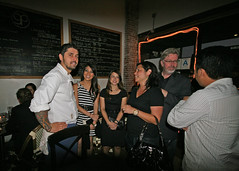 What began almost as a stunt turned into the hottest ticket in town. (The latest iteration, v 6.0, sold out in under an hour.) More than anyone else Lefebvre has, with LudoBites, popularized the pop-up. He and Krissy, who handles the front-of-the-house, have periodically considered opening a “real” restaurant, but they’re still scouting the perfect location. What’s remarkable is how they’ve continued to draw crowds now that the novelty threatens to wear off.
What began almost as a stunt turned into the hottest ticket in town. (The latest iteration, v 6.0, sold out in under an hour.) More than anyone else Lefebvre has, with LudoBites, popularized the pop-up. He and Krissy, who handles the front-of-the-house, have periodically considered opening a “real” restaurant, but they’re still scouting the perfect location. What’s remarkable is how they’ve continued to draw crowds now that the novelty threatens to wear off.
Other supper clubs simply outgrew their roots. The Trans had begun by running Starry Kitchen as a donation-based Sunday afternoon lunch party. Initially, they kept the invitees private, but eventually they Tweeted about it. Which is when the Health Department comes into the story — brandishing a printout of their Tweets. (The Trans suspect a disgruntled nearby restaurateur ratted them out.)
The Health Department let them off with a warning, and the Trans promised not to do it again. Then they did. They instituted more stringent safety measures, but for three months, they continued running Starry Kitchen illicitly. It grew so popular, they had to start a restaurant.
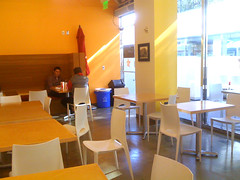 In February 2010, they opened a bright, orange-hued restaurant, also called Starry Kitchen, in a mall that caters to downtown L.A.’s lunchtime business crowd. Nguyen, gregarious and outgoing, handles the front of the house while Thi oversees the kitchen and develops new recipes. They serve pan-Asian comfort food: Malaysian chicken curry, garlic noodles, Taiwanese-fried pork chops topped with a ginger plum sauce. The deep-fried, bright green tofu balls, made from tofu that’s coated in green rice, are a favorite. Most meals cost under $10. Starry Kitchen has been written up in LA Weekly, the Los Angeles Times, Los Angeles magazine and the New York Times, not to mention dozens of local blogs.
In February 2010, they opened a bright, orange-hued restaurant, also called Starry Kitchen, in a mall that caters to downtown L.A.’s lunchtime business crowd. Nguyen, gregarious and outgoing, handles the front of the house while Thi oversees the kitchen and develops new recipes. They serve pan-Asian comfort food: Malaysian chicken curry, garlic noodles, Taiwanese-fried pork chops topped with a ginger plum sauce. The deep-fried, bright green tofu balls, made from tofu that’s coated in green rice, are a favorite. Most meals cost under $10. Starry Kitchen has been written up in LA Weekly, the Los Angeles Times, Los Angeles magazine and the New York Times, not to mention dozens of local blogs.
Buoyed by their success, Nguyen foresees opening more Starry Kitchen locations, potentially licensing it as a fast-casual chain. Why not? Before we all scarfed down pizza or chow mein, Chinese and Italian cuisine must have seemed like exotic fare.
The Trans’ success epitomizes the opportunities this niche food scene offers budding entrepreneurs. A dish of old-fashioned American entrepreneurialism served with a side of DIY spirit, the supper club is more than a showcase for chefs and ambitious home cooks. It’s a bridge between the kitchen and the restaurant, between the formal meal and the communal one, a dose of both cuisine and community.
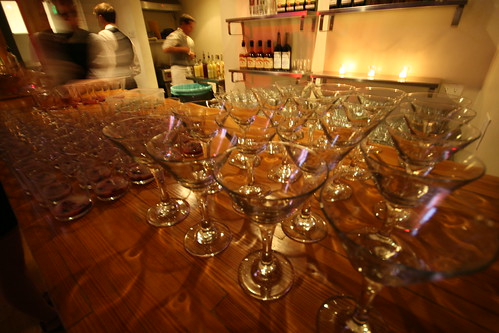
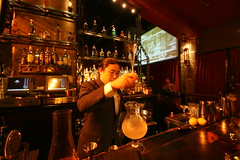
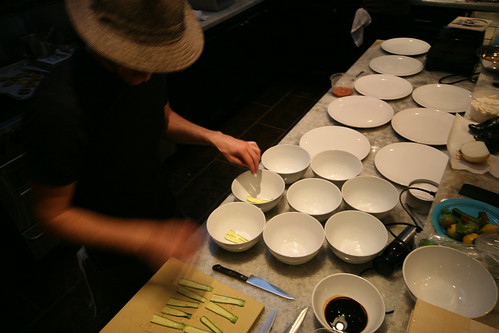
Great Article, I will have to check this out the next time I’m in the LA area. However, the next time will be my FIRST time.